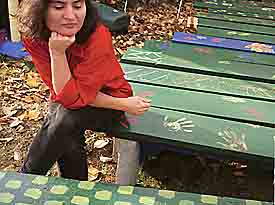| |  |
Alan Berner/Seattle Union Record
Michela
Biasutti, with the Seattle Displacement Coalition, helps bring these benches
to neighborhoods to protest Seattle's 'no-sitting'
ordinance. |
It's not the kind of sit-in you might imagine.
Seven years after the city passed a law barring people from plopping down on
Seattle's sidewalks, a homeless-advocacy group is getting ready to expand its
protest against the "no-sitting" ordinance.
While the law forbids the homeless and anyone else from sitting on the street
in business areas, it doesn't bar anybody from sitting on benches.
The Seattle Displacement Coalition, which last year placed benches around
Capitol Hill and Belltown, plans to add 32 around Ballard, Green Lake and
Fremont.
The new benches are painted green and adorned with colorful squiggles and
curious lines that upon closer examination turn out to be a stick-figure
orchestra.
John Fox, director of the coalition, said his group wants to draw attention to
a law it says discriminates against the homeless.
"We want people when they see the benches to remember it's against the law in
Seattle to sit down," Fox said.
The group has gotten permission from businesses for placement of 15 of the
benches. Fox said the group is trying to line up sponsors for the rest of them
by Christmas.
Others say the City Council passed the no-sitting law in 1993 for good reason.
City Attorney Mark Sidran said businesses downtown and in the University
District complained that having the homeless sit in front of their stores
drove customers away.
Sidran has no problem with benches placed on the streets. "The difference
between putting your butt on a bench and putting your butt on the street is
that with benches you presumably have the permission of the adjoining property
owner," he said.
But Sidran said calling the law discriminatory is "rubbish" and insulting to
the poor. "I don't know any mother who'd let their child sit on the street
without yanking on their arm and saying civilized people don't do that," he
said. "Saying the law is discriminatory is saying that the poor don't realize
that sitting on the street is just rude."
About 30 people spent their weekends in October and November, pouring the
concrete for the bases, hammering the benches together and painting them.
"It's a matter of civility," said Jan Munger, a volunteer who carried her baby
in a sling as she and others fussed over the coins and shards of pottery
imbedded in the concrete bases.
"The city shouldn't make sitting on a public sidewalk a crime," Munger said.
"Bigotry and fear of homeless people and intolerance - those are not good
reasons."
Last week, two of the first group of benches sat empty outside the Vain hair
salon in Belltown. That was a rare sight, said the salon's director, whose
hair reflected his name, "Blue."
Instead of attracting more panhandlers, he said, the benches have made the
street feel safer. "It keeps people on the street," he said. "It's where we
hang out with our customers. All the people who work on the street congregate
here smoking cigarettes and hanging out. On the weekends, the people who live
around here, the senior citizens, come and sit and drink coffee."
Fox said the benches have proved to be symbolic of what he thinks is the real
solution to the complaints that brought about the no-sitting law. "Whether
it's drug use or crime, the solution is creating a sense of community. It's
bringing people onto the street," he said.
But the Utretcht art-supply store on Pine Street in Capitol Hill asked the
group to get rid of its bench last year. Chris Rollins, the assistant manager,
said people would sleep on the bench, and the store was concerned the bench
would bang into the store's big plate-glass windows.
Outside Fremont's Touchstone Bakery, co-owner Diana Spring said she had no
concerns when she agreed to a bench outside her store. "Fremont is very
pedestrian friendly. I wanted to give people walking around a place to just
relax," she said. "The homeless are more than welcome."
She said she wasn't worried the bench would attract panhandlers. "That people
will come to Fremont to sit on our bench? I don't think that's going to
happen," she said.
When
Kery Murakami is not on strike, he is the City Hall reporter for the Seattle
Post-Intelligencer. He can be e-mailed at kery_murakami@hotmail.com.